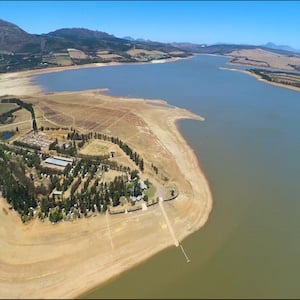
Destructive floods in Gauteng and crippling drought in the Western Cape - two extremes that both played out last week during National Water Week.
If it had been scripted, it could not have been more apt.
Water Week and the UN’s World Water Day last Thursday, designed to focus public awareness on the importance of water, came with two harsh but effective examples of how this natural substance can affect our lives and the economy when there is too much of it, or when there is not enough.
It may well be a taste of things to come.
It is true there have always been droughts and floods in South Africa, and that there has always been natural climate variability.
It is also true that as our addiction to fossil fuels has resulted in more and more heat-trapping carbon dioxide being released into the atmosphere, with the result that the world is becoming warmer.
Climate scientists use complex computer models to work out future climate scenarios. These projections deal with long-term trends, not particular events like a flood or a drought.
So while one cannot say the drought or floods are caused by climate change, both occurrences fit within climate scientists’ predictions: that the western part of South Africa will probably get drier and warmer, while the eastern part is likely to have more intense rainfall patterns – the same amount of rain falling in shorter periods, so increasing the risk of floods.
If any good has come out of the Western Cape drought, it is that it has focused our minds on the true value of water in a way that little else could have done as effectively.
At a household level, with the threat of taps running dry, thousands of people in Cape Town have realised just how much water they used to waste and how little they can get by with.
On a regional level we have learned what a lack of water means for the economy, particularly for agriculture, one of the pillars of the provincial economy, which has lost billions of rand and thousands of jobs.
The drought has also made many think beyond the tap, about where our water comes from and how much we have left, and now one hears ordinary people speak quite casually about dam levels, augmentation schemes and drilling into aquifers.
Something interesting that emerged last week was the release of the UN’s 15th annual World Water Development report that looks at water problems and suggests solutions.
It says for too long the world has turned first to human-built infrastructure to improve water supply - what it calls "grey infrastructure" - dams, reservoirs, pipelines and so on. If we are to meet the rising water demand from population growth in the face of climate change, it is time to look at "nature-based solutions" as well.
These practices have been around for thousands of years, it says, and require that people work with nature, not against it.
These solutions range from the rehabilitation of wetlands, to practicing conservation agriculture, the greening of urban landscapes to dry toilets.
In a similar vein, the South African branch of WWF called last week for increased investment in the country’s water catchment areas.
Half of South Africa’s water comes from just 8% of the land – mostly mountains including the Boland Mountains.
Christine Colvin, head of WWF’s freshwater programme, said the alien vegetation in the catchment areas that feed the six dams in the Cape system soaked up 38 million cubic metres of water a year – half the capacity of the Wemmershoek dam.
At the current rate, this could increase to 140 million cubic metres. The Berg River Dam has a capacity of 120 cubic metres.
Getting rid of aliens was one of the most cost-effective ways of securing more water.
South Africa’s water law made provision for nine water catchment management agencies to manage these vital areas – but in 20 years only two had been established.
"Without these, how do we give effect to proper catchment management? They’ve stalled for 20 years, and we have a national water crisis. We cannot stall any longer," Colvin said.




 Publications
Publications
 Partners
Partners























